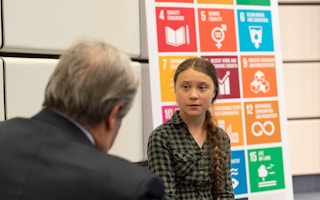This year has been lauded as an enormous test for global democracy. Nations across the globe will vote on their futures, which will test the foundations of their democratic institutions.
Many candidates will target the youth vote despite being quite old themselves. In India, a nation with a median age of 27, Prime Minister Narendra Modi is 73. US President Joe Biden, age 81, is looking to young people to secure his second term in November’s election, a presidency that he would complete at 86.
The votes of this youthful demographic were crucial in February’s Indonesian election, where candidates narrowed in on TikTok and the community’s affinity with K-Pop to get young people to vote for eventual winner, 72-year-old Prabowo Subianto.
However, it’s debatable whether courting young voters will extend to listening to them about the world that they wish to live in.
Reactionary voices tend to undermine the advocacy of young voters due to their supposed inexperience of hard times. From clickbait articles calling Gen Z lazy, all the way back to Aristotle, who termed young people “high-minded because they have not yet been humbled by life.”
Yet, when it comes to climate change, hundreds of thousands of young people have made their beliefs clearly felt. In 2018, 15-year-old schoolgirl Greta Thunberg sat outside the Swedish parliament, demanding climate action. Six years later, Thunberg’s solo protest has grown into a global youth movement, involving millions of young people from around 270 countries.
In 2019, Thunberg told the European parliament that “our house is falling apart and our leaders need to start acting accordingly.” In 2024, young people across the world are marching in the streets, launching school strikes, petitioning politicians and taking governments to court in a bid to get climate action.
In Australia, a student-run network made history with a 350,000-strong rally across the country in 2021, the largest climate mobilisation in Australia’s history. The protesters ignored pleas from the government to stay in school, arguing that more action is needed to address the climate crisis.
As the window to curb global warming to 2 degrees Celsius closes, more young people are getting angry about climate change. And researchers think that’s not necessarily a bad thing.
Climate anger and anxiety
Anger is a common emotional response to a perceived injustice, immorality or an obstacle to a desired goal. Psychologists associate anger with a moral violation, often attributed to external agents who intentionally act against or fail to act towards a preferred objective.
People concerned about climate change often mention feeling angry or frustrated, which experts refer to as ‘climate anger’ or ‘eco-anger’. A 2022 study discovered that climate change evoked feelings of anger, shame, guilt and disappointment among its 530 respondents aged 16 to 24 in the UK. They felt guilty about their own contributions to climate change and were uncertain that their actions to combat it would have any significant effect.
Researchers in the US also reported an increase in climate anger among young people. Drawing from a survey of 20,000 respondents, they found younger generations felt greater anger because they felt their futures were at risk, blaming older generations for the crisis.
However, people in the Global South feel quite different about climate change. In a survey of 10,000 young people from 10 countries, more respondents from the Philippines, India and Brazil reported feelings of fear and anxiety than respondents from Australia, UK and France. Heightened worry was lowest in the United States, where only 46 percent of young people surveyed felt concerned about climate change.
Inaction, injustice, betrayal
The anger of young people towards climate change has a few causes. One is human action or inaction. In a study conducted among 2000 young people in Norway, anger was associated with ongoing activities that accelerate global warming, as well as beliefs about poor government response. Human qualities such as indifference, denialism and prioritising money over the environment also infuriated respondents.
The double injustice of climate change where the least responsible for causing it are most harmed and have the fewest resources to cope with its consequences, also drew anger from younger generations. Other scholars found expressions of anger were related to an inability to create change for the future.
Anger was also relevant when participants felt a lack of engagement from those in power or people in general. Young people who felt their emotions and concerns about climate change were not listened to or silenced felt angry and betrayed.
Harnessing anger for action
While conventional wisdom indicates that anger has negative effects on health and well-being, recent studies show that anger is a powerful enough emotion to spur climate action. Researchers from the London School of Economics stress the power of mobilising anger to increase collective action to remedy a perceived injustice. They claim that anger works as a motivational signal that convinces more people that others will soon act and this makes them want to join.
A growing body of research also indicates that expressions of public outrage are more likely to be re-shared on social media sites than neutral content. Other scholars contend that collective anger expressed through climate marches helped promote information-seeking about climate change. A study in Australia further revealed that expressions of anger can help one’s mental health.
Given our climate predicament, young people are right to be mad. Some will eventually feel overwhelmed and burned out. Providing safe spaces for them to continue to voice their climate anger may help prevent that. Being heard can help address feelings of powerlessness, as well as build camaraderie and support.
The adults also need to do their part. Adult allies who acknowledge intergenerational injustices, validate emotional experiences and support youth capabilities can help provide reassurance and fuel transformative action.
These strategies will help ensure that the fight of our young people for a more liveable and sustainable future will not lose its momentum.
Dr Justin See is a postdoctoral research fellow in climate change adaptation from the Sydney Environment Institute at the University of Sydney.
Originally published under Creative Commons by 360info™.


















